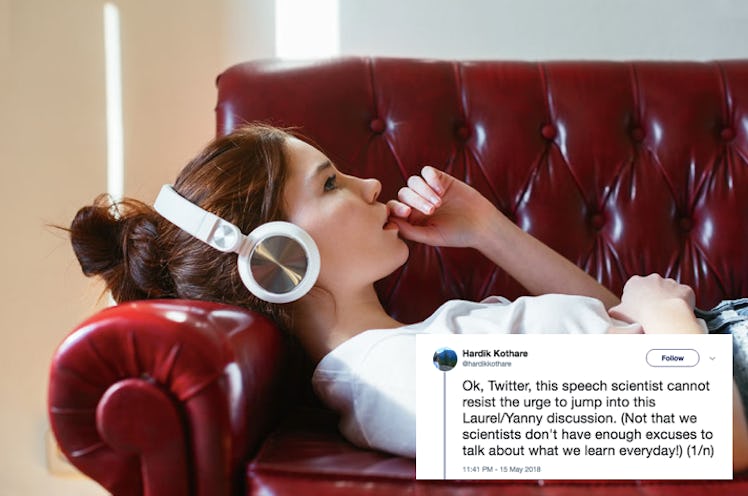
A Speech Scientist Settled The "Yanny Vs. Laurel" Debate On Twitter, But I'm Still Shook
By now, you've probably heard more people saying the words "Laurel" and "Yanny" than you've ever wanted in your life. But this viral controversy is far from over, and now, a speech therapist's tweets about the Yanny vs. Laurel debate have given us all even more to think about with this internet-borne head-scratcher. You and your friends have probably been arguing the past few days about which one of you hears "Yanny" when you listen to that now-viral recording, and which of you is certain it's actually "Laurel." At this point, you might even feel confident there's something wrong with your friends if they're not hearing what you're hearing. But in truth, according to this speech therapist, this whole debacle comes down to how the word was recorded, and how you're perceiving the sound.
Viral posts like this one can seem to appear out of thin air, suddenly infiltrating mainstream media with the force of a tsunami. You might think the whole mystery started when YouTube vlogger Cloe Feldman posted a video of the audio recording, tweeting, "What do you hear?!" But in truth, it all began with a high schooler named Katie Hetzel, according to Wired. Hetzel was apparently studying for a world literature class, and "Laurel" was one of her vocabulary words. Upon looking the word up, the news outlet explains, she realized the word's audio recording sounded more like "Yanny" to her than anything resembling "Laurel."
"I asked my friends in my class and we all heard mixed things," Hetzel told Wired, and once she posted the question to her Instagram story, the rest was history. Through a series of posts from students at her school, the debate quickly went viral through social media.
Now, speech therapist Hardik Kothare, who works in the speech neuroscience lab at the University of California at San Francisco as a Ph.D. candidate, is ready to settle the debate.
Taking to Twitter on Wednesday evening, Kothare declared he couldn't sit by any longer while people mused about how this whole Yanny/Laurel confusion could even be happening. "Here's what I think is happening..." Kothare tweeted. "The signal has been cleverly synthesised to trick us humans and our amazing ability to perceive speech in a dynamic manner."
Um, what?
Kothare then went on to explain that vowels are produced when our vocal tracts move at varying frequencies, and we all perceive these differences in frequencies in a unique way. It's kind of like how a Boston accent is different from a Midwestern one.
"Due to these variability in formant values, the human brain is trained to perceive and interpret speech on the fly in a remarkable way," Kothare continued in a following tweet, explaining further that he believed this sound might have been tampered with.
In other words, the sound in the audio recording we're all obsessing over might have been manipulated or changed, in one way or another, thus opening up the possibility of some hearing "Yanny," while others hear "Laurel."
Another factor that might play into this is the fact that the word is standing on its own, rather than being used contextually or in a sentence. According to Marc Tinkler, the CTO and co-founder of Vocabulary.com, who spoke with Wired about the "Yanny" vs. "Laurel" debate, all of these words were recorded without context, which may have affected how they were spoken. "We set [the singers] up with laptops with really great microphones in a DIY sound booth," Tinkler explained. "They would just sit there and a word would appear on the screen and they would say it. They did this thousands of times."
But the best part about all of this has nothing to do with what the real truth is (spoiler alert: there probably isn't a right answer), and everything to do with who spoke the word "Laurel" originally for Vocabulary.com: one of the original members of the Broadway production CATS, according to Wired.
"We hired a bunch of opera singers to record 200,000 words, basically," Tinkler told Wired. Though he didn't reveal the name of this mystery magic man, he did admit that this same performer recorded over 36,000 words for Vocabulary.com, which basically means the search is now on for the next viral audio debate.